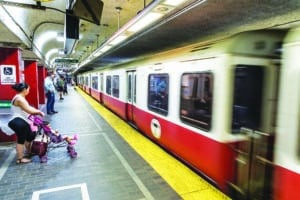Citing a “continued failure” to prevent runaway trains despite past warnings, federal overseers Friday ordered the MBTA to conduct a new series of safety briefings for workers and produce new documentation putting necessary inspection steps on the record.
The Federal Transit Administration said Thursday that the T has fallen short of responding to last month’s order to rein in a pattern of disabled trains rolling out of control, escalating its already-dramatic intervention at the transit agency with new requirements for action.
Starting at 12:01 a.m. Saturday, the MBTA must conduct “an immediate safety standdown,” which will ban any worker from moving rail transit vehicles in maintenance yards or shops until they attend a special safety briefing.
The briefing must provide “all workers who may in the course of their work operate a disabled rail transit vehicle and all workers who may have cause to secure these vehicles” with an overview of the circumstances in three recent incidents: a May 28 “rollaway” at Cabot Yard, a May 30 “rollaway on the mainline” near Braintree Station, and the latest runaway train that occurred Monday, when a train with faulty brakes slipped out of a rail yard and onto the main passenger service segment of the Red Line near Braintree.
MBTA officials must also brief workers on “policies and procedures that prevent unintended or uncontrolled movements,” the FTA ordered.
The T’s higher-ups will need to update the FTA at least daily starting on Monday “until all applicable workers have received this briefing,” plus submit copies of the materials used and sign-in sheets recording employee attendance.
“There have been three uncontrolled train movement incidents since May 28, 2022, including on July 25 when MBTA experienced an uncontrolled train movement at the Braintree Station,” FTA Associate Administrator for Transit Safety and Oversight Joe DeLorenzo wrote in a new letter to MBTA General Manager Steve Poftak. “While no injuries have resulted from the recent incidents, uncontrolled train movements, especially on the mainline, are exceptionally dangerous, can result in collision or derailment, and pose a substantial risk of injury or death to employees in the path of the train.”
An MBTA spokesperson provided a copy of the letter to the News Service on Friday afternoon.
“The MBTA shares the Federal Transit Administration’s concerns over recent incidents of uncontrolled movements involving out-of-service rail cars. Having received the FTA’s letter yesterday, the MBTA is taking steps to execute the immediate actions required by the FTA,” spokesperson Joe Pesaturo said in a statement. “Fully supporting the FTA’s ongoing scrutiny of safety-related processes and practices, the MBTA is committed to providing the training and tools necessary for employees to create and maintain a culture in which safety is prioritized.”
FTA officials also ordered the beleaguered transit agency to take additional steps in the near future.
Within five days of DeLorenzo’s letter, the MBTA must prepare checklists outlining existing procedures for linking and unlinking trains and require workers to follow those steps. And within 10 days, the T needs to “develop and implement a form to document the results of the ‘circle check’ inspection for rail transit vehicles.”
The mandatory “safety standdown” and checklist requirements add to the FTA’s nearly unprecedented involvement at the MBTA.
Federal investigators launched a safety management inspection in April — only the second such time the FTA has taken that step — and in June ordered immediate safety fixes to address the most pressing issues they uncovered.
One of the four critical areas the FTA flagged was the T’s failure to prevent runaway trains. But six weeks later, DeLorenzo said in his Thursday letter that “there is a continued failure to sufficiently prevent unintended and uncontrolled train movements by disabled trains.”
MBTA officials said they met all of the deadlines and requirements listed in the June 15 special directives and have issued new safety trainings and policies regarding train movements in rail yards and car houses. The agency is also working on a pilot program to implement “blue flag” procedures, in which blue flags or lights indicate workers are on, under or between rolling equipment, on its rapid transit network.
The FTA probe is expected to produce a final report some time in August, which could highlight problems and recommendations beyond those already flagged.






